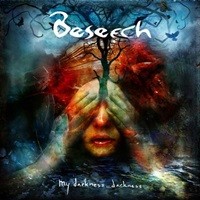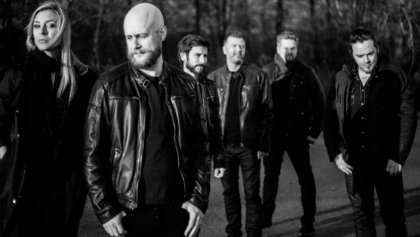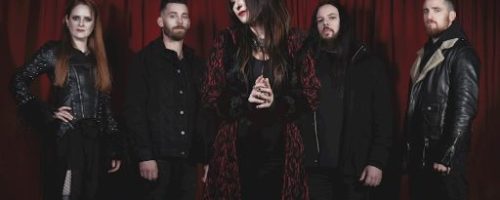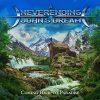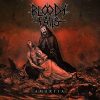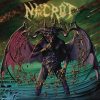Beseech – Shimmering Darkness
Wednesday, 9th March 2016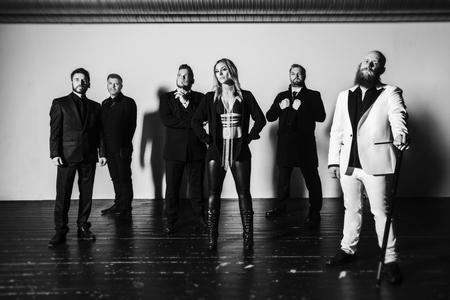
In the early 1990’s, there was a new sub-genre of metal that took a lot of alternative elements from various groups such as Dead Can Dance, Depeche Mode, The Cure, and the Smiths and applied heaviness to develop a fresh take on the genre. Acts like Paradise Lost, Tiamat, Sentenced, and Cemetary gained traction in the scene, even if many started on different, often heavier/ more underground doom or death laden paths. Sweden’s Beseech would be another group that had doom roots in their early 90’s demo period, morphing eventually to their gothic style that they would establish by their debut album …From a Bleeding Heart.
Initially going their separate ways in 2006, three of the members Klas Bohlin, Robert Vintervind and Manne Engström would reunite around 2012, seeing if they could write material together. Their love for Beseech continued, assembling a new rhythm section and female vocalist to become the current incarnation of the band that we hear today on their sixth and latest album My Darkness, Darkness. Striding confidently into beautiful melodies, haunting hooks, and melancholic bliss, it’s the type of album that gothic metal followers spin on constant rotation.
Speaking with vocalist Klas Bohlin we’ll find out where Beseech is coming from today, the man’s love for psychedelic / garage rock, as well as his thoughts on the numerous record labels Beseech has dealt with through their career.
Dead Rhetoric: The obvious first question is how did you decide to give Beseech a second life after a decade long absence? Did you remain good friends with the band at the end, or was it just necessary to have a long break and re-charge those creative batteries so to speak?
Klas Bohlin: I think both ways were actually necessary. The connection to this comes from myself and Robert, we’ve always been great friends throughout the years and we’ve actually talked a lot about doing something with music. We were quite uncertain if this should be something as Beseech or something else. When we met up and shared ideas to new songs, it sounded like Beseech so much, so Beseech it is.
Dead Rhetoric: What do the newest members Johan, Håkan, and Angelina add to the current Beseech lineup in terms of ability, character, and personality?
Bohlin: When we started looking for new members, we almost knew at once when we had written the first songs we were after something different. All the members somehow have a relationship to the Beseech studio where we recorded all the Beseech albums. In the years when Beseech was put to rest, both Robert, myself and Manne had other projects going on within that studio. We decided to pick members that we had worked with before- to start with Johan, he’s also one of the producers from Studio Mega and he’s a member of the Fascination Street Studios, besides putting Johan on bass we also got ourselves a talented producer. Håkan and Angelina though, I got to know them through a band called The Fantastic People, also with that band we decided to go to Studio Mega and Johan helped us with the mixing. It was a smart move to pick people that we already knew.
Dead Rhetoric: My Darkness, Darkness is the new record – how did the songwriting and recording sessions go, was there any sense of apprehension or worry about making the final product meet the quality of previous Beseech albums or do you just have the confidence to roll things out like riding a bike again?
Bohlin: At first we didn’t know exactly how this would end up. I remember when Robert and I started writing, we called Manne a few days after and asked him if we could meet up, maybe we need to record some demos. I had some songs, Robert had a few and then we took it from there and put it together. It was a natural development writing with the new experience.
Dead Rhetoric: How did the idea to cover the Jimmy Webb song “Highwayman” come into being – as well as shooting a video?
Bohlin: I discovered the song through a live version by Johnny Cash. I believe that a great song is a great song- it doesn’t matter what kind of genre you put it in. When we decided to give “Highwayman” the Beseech sound 100%, afterwards through a common friend we sent the song to Jimmy Webb’s management. A few days later they got back to us and told us Jimmy was quite amazed about the reincarnation that we have made to his song that so many had done before us.
Dead Rhetoric: Did you think at the time of your early 1990’s start that you would be one of the pioneers in the gothic metal scene?
Bohlin: No, not really. Of course when we started playing, we had the ambition to do something more than just being a local band playing local gigs. In the early days we tried to spread our music through the underground, we did a lot of tape trading, fanzine interviews and so forth. I don’t think we had the ambition to become pioneers within our genre.
Dead Rhetoric: What are some of your fondest memories surrounding Beseech? Especially in terms of particular recording sessions, live shows/ tours, places you visited or people you may have met?
Bohlin: The first gigs we did outside Sweden were something special. We did two-three shows in Germany, we were completely unorganized at that time. We travelled by train, we didn’t have any chaser for the drums, we travelled by the local buses. We slept at parties after the shows- it was a great experience and so much fun. It is how you see your bandmates as a second family because being in a band that does touring it’s difficult to explain to someone who hasn’t been there. I like the whole band thing, it brings a lot of great memories that’s for sure.
Dead Rhetoric: You were on a variety of labels from Metal Blade and Pavement Music to Napalm Records during the first Beseech run – how did you feel the band was treated overall, did you have a lot of trust in their staffs and knowing how to properly promote your efforts?
Bohlin: I especially remember when we were signed to Metal Blade, we were working with a guy named Michael Trengert and he was very nice to us. He did his best to get our music out, I think he did a pretty good job. After that we moved on with Pavement, then there was more like a business relationship. We didn’t know them as people and we didn’t know them. It was more strictly business and it got even worse with Napalm. At that point they had started getting into (being) a more major label. They are quite big today actually. Now we are signed to Despotz and we are back to where we were with Michael at Metal Blade. I can give our label manager a call this evening and just exchange some ideas. Despotz is really good at treating their bands like they are a part of a family, and I like that way of working. There is no secret stuff going on, we are totally open to each other.
Dead Rhetoric: Have your thoughts on the metal scene in general shifted through the years?
Bohlin: Yes, definitely. I remember after our first album …from a Bleeding Heart, I remember that it was getting too much to listen and write music that was similar to the music that we were playing. I started to explore other kinds of music, one genre that has been really special for me has been the late 1960’s, psychedelic years… 1968, 1969 and garage rock and the emotional, darker kinds of country music have affected me in the later years.
Dead Rhetoric: What types of hobbies or activities do you like to pursue when you have the free time to do so away from Beseech to sort of recharge your batteries?
Bohlin: I enjoy television series, that’s the relaxing part of it. I’m into collecting records- there is nothing that can compete with the record adrenaline. Finding a record that you have been looking for, for a few years and you get it at the right price, that’s thrilling to actually do it.
Dead Rhetoric: How much importance do you place on imagery and the visual element in Beseech?
Bohlin: Of course it’s important when you see a band live. I think that it’s important to spend a little effort in making that part of the show. There’s one expression through the music and another expression in the performance. I also believe that since I collect records that a record cover is very important piece of the puzzle. The new album will be available on vinyl and it’s actually the first Beseech album that will be released on vinyl. For me it’s like Christmas Eve being ten years old, I’m really looking forward to holding the baby.
Dead Rhetoric: Being a fan of vinyl especially from the 1960’s and 1970’s, what are some of your most treasured albums in your collection?
Bohlin: Oh… one of my rarest Kiss items is the first Kiss album without “Kissing Time”. I’ve also got like Rock and Roll Over, the Japanese edition. And then there are of course some stuff with Led Zeppelin, Black Sabbath. In general I appreciate collecting heavier kind of music. If you haven’t discovered the Moody Blues, they are great for psychedelic music. Days of Future Passed or On the Threshold of a Dream are my favorites. After the 70’s the creative core of the band got lost.
Dead Rhetoric: Have you started the follow up songwriting process for the next album, and if so do you think you will follow a similar direction as My Darkness, Darkness?
Bohlin: I think that we have found a path which feels interesting. I’ve written a few new songs and then there was also some material that we decided to put on hold, not because it was bad but when we selected the songs for My Darkness, Darkness, those songs somehow fit in a good way together. Our next album, I can’t make any promises but I think that we have found our way.
Dead Rhetoric: Will you support My Darkness, Darkness with touring or is the band going to be careful in picking spots for live performances?
Bohlin: We are looking into touring of course. Playing live is really important for us. We are talking to a few booking agents and we really hope that this album will help us to make an impact. It will be interesting for others to book us out, and then we will take it from there.











